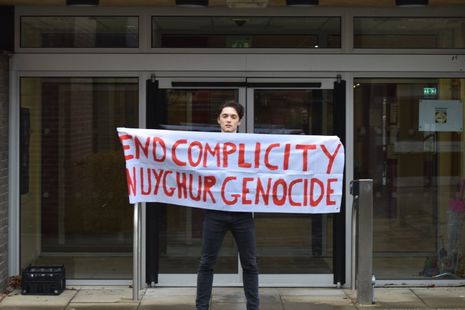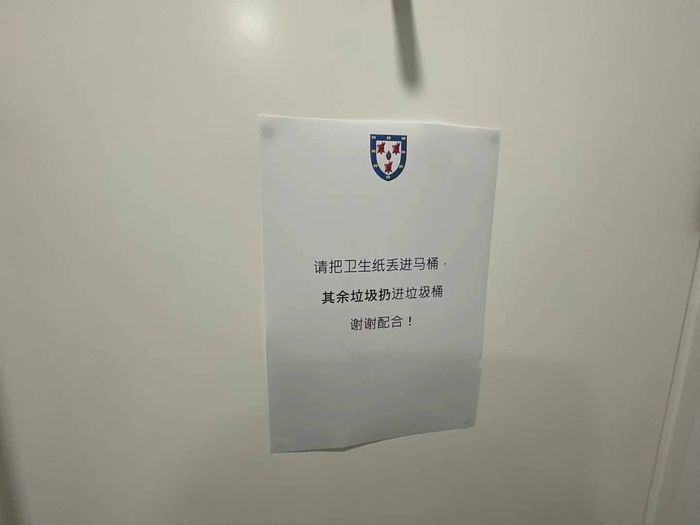Students attack University ‘silence’ over China Uyghur rights abuses
Two open letters have been sent to the AMES faculty, with an SU motion to be submitted next week

Cambridge students have launched a Uyghur Rights Campaign in response to “silence” within the University toward China’s treatment of Uyghur Muslims.
Human rights groups allege that China has detained more than one million Uyghurs, mostly in the Xinjiang Uyghur Autonomous Region, with the US, among other countries, having accused the state of committing genocide.
The campaign, backed by Cambridge University Amnesty International, contains two open letters addressed to the Vice Chancellor and the AMES Faculty. The letters call on the University to stop accepting funding and partnerships with companies such as Huawei, which has given over £28 million to the University since 2016 and has close ties to the Chinese state.
Delivered last week, the Uyghur-Genocide Complicity Letter and Faculty Complicity Letters demand the Faculty stop sending Chinese studies students to Beijing after the year abroad placement was restarted this year for the first time since 2019.
The campaign emerges amid the AMES Faculty’s ongoing partnerships with universities such as Peking and Tsinghua, which are both funded by the Ministry of Education in China.
Among other demands, the letters enlist the University to immediately end all ties with Huawei and other Chinese companies and institutions linked with the Uyghur genocide, to issue a public statement condemning the genocide, and to establish a Genocide-Studies Forum and a Uyghur Research Fund.
One open letter states: “That not one research paper in the history of the Faculty has been produced on Xinjiang or on Uyghurs – barring one paper in 2006 – even after mounting and increasingly detailed reports of Uyghur-targeted mass internment and human rights abuses, warrants significant questioning.”
The campaign began after its co-founder, Nikos Kouthouri-Whittaker, a Chinese studies student, says he found that Faculty members showed “disinterest and disengagement” towards the Uyghur genocide.
Kouthouri-Whittaker reports one encounter with a Professor in Chinese studies, who stated that they were “not aware of any human rights abuses in Xinjiang” explaining this was because they “had never been there”. He told Varsity that he was then encouraged to go there to “find out for myself”.
In an email sent to his Professors in AMES about the possibility of a Genocide-Studies Forum, Nikos recalls “receiv[ing] no reply, other than the suggestion that I join a society for the ‘issues I care about’.”
Kouthouri-Whittaker, alongside two Uyghur students, founded the Campaign out of frustration with what they believe is a culture of denial and a refusal to discuss the Uyghur genocide within Cambridge University.
“So-called ‘China experts’ claim they ‘lack authority’ or ‘aren’t qualified’ to talk about the genocide of Uyghurs and other Turkic minorities. ‘Contemporary issues’ aren’t their field of expertise,” Kouthouri-Whittaker said.
“At what point in the genocide will academics and academic institutions realise it does not take a specialist to recognise the imminent destruction faced by a group of people, and to the fragile order that seeks to protect human rights around the world?” he added.
An action motion will be submitted to the SU’s Student Council on Monday (19/02), which has been seconded by Sam Hutton, Chair of the SU’s Ethical Affairs Campaign, and Maroof Rafique, SU BME Officer.
Sam Hutton told Varsity: “I think that many students and staff forget the human rights abuses that are currently ongoing in Xinjiang. In a culture that has stoked geopolitical fears towards China, it’s important that we are able to clearly outline the specific acts that constitute a genocide.”
“These open letters very clearly show the University’s complicity in this genocide, and the concrete steps that the University can take to improve its ethical standing, especially cutting ties with surveillance companies, directly responsible for discrimination against Uyghur peoples,” he said.
As the Ethical Affairs campaign, we strongly believe that by leveraging the University’s global reputation, we can make powerful statements through these seemingly small actions, and that by raising these issues within the University, we can emphasise the social responsibility that we all have to oppose genocide in all cases,” Hutton continued.
The SU’s BME Officer, Maroof Rafique, also pledged his support, stating: “I am disheartened to learn about the culture of ‘denial’ and ‘silence’ that pervades our university regarding the Uyghur genocide.”
“As educators and scholars, we bear the responsibility to foster an environment that encourages critical discourse, awareness, and action on global human rights issues. Silence and indifference only serve to perpetuate injustice,” Rafique added.
The campaign’s launch comes after Varsity reported in January on the University’s ongoing funding ties with Huawei, which had been deemed a “security threat” to the UK government.
A report by UK-China Transparency last September alleged that the University had taken over £2million in funding from a Chinese state-owned military aerospace company, CASC, known for being one of China’s leading manufacturers of military drones.
Campaigners have raised concerns regarding the “influence” of the Chinese Communist Party (CCP) in Sinology, otherwise referred to as Chinese studies.
Sam Dunning, Director of UK-China Transparency, told Varsity: "In general, more transparency is needed about self-censorship and CCP interference in the Sinology community in the UK.”
“The CCP has the intent and capacity to interfere in Sinology in the UK and this must not be a taboo topic. This phenomenon has been called out by a dozen human rights and academic freedom organisations such as Index on Censorship, as well as by our democratic representatives. The Intelligence and Security Committee of Parliament has said that the CCP ‘targets individual academics’ and that its ‘attempts to interfere with, and stifle debate, amongst the academic community in the UK are a significant problem’,” Dunning said.
“It is important to note that the biggest victims of the CCP’s ‘narrative control’ campaign are Chinese people. When Chinese students here in the UK express views on these issues that the CCP dislikes, they are taking a huge risk. If they persist, then they are in effect saying goodbye to their family forever and choosing life as a refugee. Those are the stakes for our friends from China, and we would do well to remember it,” Dunning continued.
The University of Cambridge has been contacted for comment.
 News / University Council rescinds University Centre membership20 February 2026
News / University Council rescinds University Centre membership20 February 2026 News / Cambridge academics sign open letter criticising research funding changes22 February 2026
News / Cambridge academics sign open letter criticising research funding changes22 February 2026 News / Hundreds of Cambridge academics demand vote on fate of vet course20 February 2026
News / Hundreds of Cambridge academics demand vote on fate of vet course20 February 2026 News / Union cancels event with Sri Lankan politician after Tamil societies express ‘profound outrage’20 February 2026
News / Union cancels event with Sri Lankan politician after Tamil societies express ‘profound outrage’20 February 2026 News / Judge Business School advisor resigns over Epstein and Andrew links18 February 2026
News / Judge Business School advisor resigns over Epstein and Andrew links18 February 2026










